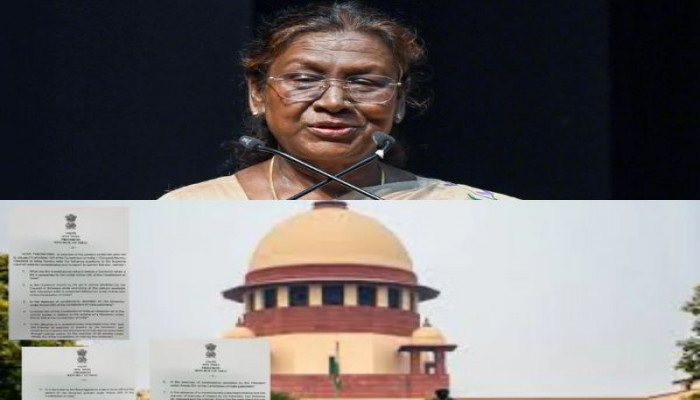President Murmu poses 14 questions to Supreme Court on governor's bill assent ruling under Article 143
- In Reports
- 06:33 PM, May 15, 2025
- Myind Staff
The President invoked her powers under Article 143 of the Constitution to question the Supreme Court on its ruling in the Tamil Nadu governor case.
Referring to the Tamil Nadu government versus Governor case, President Droupadi Murmu asked how the apex court could have issued such a ruling when the Constitution did not stipulate those conditions.
Her move followed the Supreme Court’s April judgment, where a bench of Justices J B Pardiwala and R Mahadevan allowed judicial intervention if Governors delayed assent to legislative bills for an extended period. The bench also stated that the President must make a decision within three months on bills referred by the Governors.
On Tuesday, Murmu posed several questions to the Supreme Court about its decision to set deadlines for the President and Governors to act on Bills. According to The Times of India, she raised the following 14 questions for the court’s consideration:
1. What are the constitutional choices available to a Governor under Article 200 upon receiving a Bill?
2. Is the Governor required to act solely on the aid and advice of the Council of Ministers when dealing with such Bills?
3. Can the Governor’s discretion under Article 200 be subject to judicial scrutiny?
4. Does Article 361 completely shield a Governor's decisions under Article 200 from court review?
5. In the absence of express timelines in the Constitution, can the judiciary impose time limits on Governors for acting on Bills?
6. Can the President’s discretion under Article 201 be judicially reviewed?
7. Is the President bound by judicially prescribed timelines in the absence of constitutional mandates?
8. Must the President necessarily seek the Supreme Court’s opinion under Article 143 when a Bill is reserved by a Governor?
9. Can courts intervene in decisions by the Governor or President before a Bill becomes law?
10. Is it permissible under Article 142 to override or substitute decisions of the President or Governor?
11. Does a Bill passed by a state legislature become law without gubernatorial assent?
12. Should constitutional interpretation questions first be referred to a Constitution Bench under Article 145(3)?
13. Does Article 142 extend beyond procedural matters to allow rulings that contradict existing laws or constitutional provisions?
14. Can Centre-state disputes be resolved outside Article 131, which provides for exclusive SC jurisdiction?
The President said that Articles 200 and 201, which apply to the Governor and the President, respectively, “do not stipulate any time frame or procedure” to be followed while considering whether to grant or withhold assent to a Bill passed by an assembly.
She stated, as quoted by TOI, “The exercise of constitutional discretion by the Governor and the President under Articles 200 and 201 of the Constitution, respectively, are essentially governed by polycentric considerations, including federalism, uniformity of laws, integrity and security of the nation, doctrine of separation of powers.”
She invoked Article 143(1) to seek the Supreme Court’s opinion, as the apex court has in the past delivered conflicting judgments on the justiciability of presidential assent to bills.







Comments